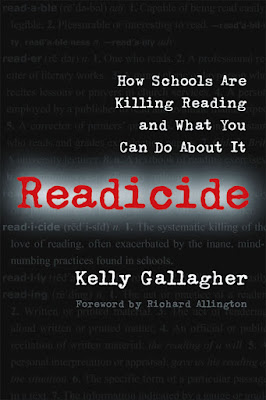Please note: this is a book I read in 2017. Due to starting a new job, I kept up in reading but fell behind in blogging. Reviews for 2018 reads will begin after the remaining 2017 reviews are posted. Thank you for your patience!
"Read-i-cide (n): The systematic killing of the love of reading, often exacerbated by the inane, mind-numbing practices found in schools.
Reading is dying in our schools. Educators are familiar with many of the factors that have contributed to the decline-- poverty, second-language issues, and the ever-expanding choices of electronic entertainment. In this provocative new book, Kelly Gallagher suggests, however, that is it time to recognize a new and significant contributor to the death of reading: our schools.
In Readicide, Kelly argues that American schools are actively (though unwittingly) furthering the decline of reading. Specifically, he contends that the standard instructional practices used in most schools are killing reading by:
--valuing the development of test-takers over the development of lifelong readers
--mandating breadth over depth in instruction
--requiring students to read difficult texts without proper instructional support
--insisting that students focus solely on academic texts
--drowning great books with sticky notes, double-entry journals, and marginalia
--ignoring the importance of developing recreational reading and...
--losing sight of authentic instruction in the shadow of political pressures.
Kelly doesn't settle for only identifying the problems. Readicide provides teachers, literacy coaches, and administrators with specific steps to reverse the downward spiral in reading-- steps that will help prevent the loss of another generation of readers."
This was a book that my cooperating teacher (and other English teachers) read while I was student teaching. Once I found out that I was going to teach a class of my own, I felt this sense of urgency to finish reading this book. This entire book is all about attempting to keep a love of reading alive in students or rekindle that love where it has died or failed to thrive in other students.
Growing up, my parents read to me a lot and once I was able to read on my own, I devoured book after book. I wasn't much of a trouble-maker, but one clear memory I have of getting trouble was when the newest Harry Potter came out (I think it was Order of the Phoenix, if I remember correctly) and I got in trouble for staying up way too late reading it. I loved reading and being a quick reader was something that I took great pride in and to a certain degree, continue to take pride in. I can't imagine my life without my love of reading. So that's why I want to help my students find their spark and realize that reading is not just something that their teachers make them do. I want them to realize that reading is something they can do for themselves.
This book is filled with ideas for how to help students find their love of reading. In my classroom, we do SSR (Sustained Silent Reading) and reading projects, for example. We do Article of the Week, which my students hate because of the responses that I have them write, but it gets them reading a variety of different things. So they're getting fiction and nonfiction. I would like to speak to my experience implementing some of these practices after I've finished a full year with my 9th graders. I will say that the practices I am implementing are the practices that I continue to feel really good about having my students do and that I will continue to do in future classrooms. This is a powerful book that I think every teacher should read. Not just English teachers like me, but every teacher in every subject. Literacy is not just something you get in English class, but your math class, social studies, science... everywhere.
I appreciate that this book isn't just griping about how this is a problem, but it offers solutions that Mr. Gallagher has put into practice himself and that has worked for his students. It's evidence like that that motivates me to want to try different practices like this.
Overall, I recommend this for any teacher who is looking to build literacy skills in their classroom. I give 'Readicide':
Thanks for Reading!
--Jude
"Read-i-cide (n): The systematic killing of the love of reading, often exacerbated by the inane, mind-numbing practices found in schools.
Reading is dying in our schools. Educators are familiar with many of the factors that have contributed to the decline-- poverty, second-language issues, and the ever-expanding choices of electronic entertainment. In this provocative new book, Kelly Gallagher suggests, however, that is it time to recognize a new and significant contributor to the death of reading: our schools.
In Readicide, Kelly argues that American schools are actively (though unwittingly) furthering the decline of reading. Specifically, he contends that the standard instructional practices used in most schools are killing reading by:
--valuing the development of test-takers over the development of lifelong readers
--mandating breadth over depth in instruction
--requiring students to read difficult texts without proper instructional support
--insisting that students focus solely on academic texts
--drowning great books with sticky notes, double-entry journals, and marginalia
--ignoring the importance of developing recreational reading and...
--losing sight of authentic instruction in the shadow of political pressures.
Kelly doesn't settle for only identifying the problems. Readicide provides teachers, literacy coaches, and administrators with specific steps to reverse the downward spiral in reading-- steps that will help prevent the loss of another generation of readers."
This was a book that my cooperating teacher (and other English teachers) read while I was student teaching. Once I found out that I was going to teach a class of my own, I felt this sense of urgency to finish reading this book. This entire book is all about attempting to keep a love of reading alive in students or rekindle that love where it has died or failed to thrive in other students.
Growing up, my parents read to me a lot and once I was able to read on my own, I devoured book after book. I wasn't much of a trouble-maker, but one clear memory I have of getting trouble was when the newest Harry Potter came out (I think it was Order of the Phoenix, if I remember correctly) and I got in trouble for staying up way too late reading it. I loved reading and being a quick reader was something that I took great pride in and to a certain degree, continue to take pride in. I can't imagine my life without my love of reading. So that's why I want to help my students find their spark and realize that reading is not just something that their teachers make them do. I want them to realize that reading is something they can do for themselves.
This book is filled with ideas for how to help students find their love of reading. In my classroom, we do SSR (Sustained Silent Reading) and reading projects, for example. We do Article of the Week, which my students hate because of the responses that I have them write, but it gets them reading a variety of different things. So they're getting fiction and nonfiction. I would like to speak to my experience implementing some of these practices after I've finished a full year with my 9th graders. I will say that the practices I am implementing are the practices that I continue to feel really good about having my students do and that I will continue to do in future classrooms. This is a powerful book that I think every teacher should read. Not just English teachers like me, but every teacher in every subject. Literacy is not just something you get in English class, but your math class, social studies, science... everywhere.
I appreciate that this book isn't just griping about how this is a problem, but it offers solutions that Mr. Gallagher has put into practice himself and that has worked for his students. It's evidence like that that motivates me to want to try different practices like this.
Overall, I recommend this for any teacher who is looking to build literacy skills in their classroom. I give 'Readicide':
Thanks for Reading!
--Jude



No comments:
Post a Comment
I love your comments! Comment away!